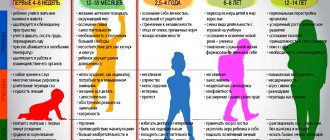Age characteristics
Don't rush to scroll through this item! It may seem to you that psychology is a boring thing and not particularly necessary, but it’s not like that: this science has a direct relationship to the process of raising a child, especially to changes in his behavior. It will be easier for you to understand your baby and find a common language with him if you know exactly what is happening to him.
First of all, speech development. At 2 years old, a child turns into a sponge that absorbs everything he hears and tries to reproduce. This applies not only to people’s speech, but to everything he sees and hears on television and radio. From which a completely logical conclusion follows: if possible, control the speech of nearby adults and what your child is watching. Also during this period, children are able to understand the speech of adults and conduct short but meaningful dialogues, respond to requests and ask in return. But the vocabulary is still small.
Photo source: shutterstock.com
Also, at 2-3 years old, the baby learns to express and control his emotions, but, unfortunately, he is not always able to do this, since joy and anger come over him very suddenly. Carefully monitor his condition: support him in moments of showing love or kindness and calm him down when the baby is excited about something. In addition, we need to teach children to control their emotions and express them correctly, and most importantly, show them where the boundaries of acceptable behavior are, what can and cannot be done.
The most important characteristic of a 3-year-old child is egocentrism. This means the following: he believes that everything that happens in this world is directly related to him. That is, when playing and communicating with peers, which begins to gain momentum, he will proceed solely from his own interests. Egocentrism manifests itself in the need for attention from adults every second, without a break for food or sleep. This does not mean that the baby will necessarily grow up to be selfish, it’s just that he is looking for the support of an adult who can help if something happens. This also includes the children’s desire to show that he can do a lot on his own.
It is worth mentioning here the so-called three-year crisis. In fact, the topic of this difficult time is quite extensive; it needs to be analyzed separately. The bottom line is this: the baby begins to realize himself as an independent adult with his own “I”, his own needs and desires, who copes quite well without the support of an adult. And then he is faced with the fact that he cannot carry out everything he has planned on his own due to various circumstances, the main ones of which are the ubiquitous adults and such a young age. Indignation at this is expressed by various symptoms: stubbornness, aggression, protest, self-will, despotism, obstinacy and devaluation of the established order of things. Hysterical states in such a crisis are quite common.
How does the 2 year crisis manifest itself?
The crisis of 2 years, unfortunately, manifests itself very violently. The child begins to demonstrate his dissatisfaction with every little thing, throws things and toys on the floor, and even hits his parents. The sources of scandals and screams of the baby can be (most often) minor little things.
For example, a baby may throw a water bottle on the floor because it is only half full. Or the child wants to wear warm pants or rubber boots outside, not taking into account the fact that it is hot outside. In such cases, explanations are unlikely to help. And all stories, as a rule, end in scandals.
Most parents admit that it is not the child’s reaction to refusals or tantrums out of nowhere that frightens them, but rather the reaction of the people around them. Most often, if a child throws another tantrum in a crowded and public place, he will find some “well-meaning” person who will start spouting moralizing lectures without really understanding the situation.
Photo by Marcos Paulo Prado on Unsplash
But now we are not talking about strangers, and not about the bad manners of individuals. Let's return to the child. When such “ugly” behavior takes over, parents begin to go through all sorts of cases - at what stage did they miss the upbringing of their child, and how to turn back to fix everything.
But, no matter how ironic it may sound, in fact, the parents are not to blame for everything that is happening. The very reason for all this is the crisis. Its reason is that the child begins to more and more actively master the world around him. It's interesting and exciting for him. And he wants more and more independence.
But, due to his age, he will not yet be able to completely do without the help of his parents. And here comes the turning point. Do it yourself and reject the help of your parents, or accept this help, which means staying small. Of course, every child wants to grow up faster. It is this desire and desire that is inherent in this behavior of a two-year-old child. “I myself!” - the motto of this difficult period. And it is by this phrase that one can “recognize” the crisis that has begun.
Photo on Unsplash
When the child was little, he happily walked into the arms of his mother or father, ate from a spoon, lay obediently and waited for him to be dressed and allowed many more manipulations to be done to him. Now the baby begins to understand that there is “he”, there is “mom” and “dad”. Also, the child learns the limits of what is permitted; in other words, he tests the waters.
During this period, it may seem to parents that the child is deliberately trying to piss them off, trying to manipulate or establish power over others. But this is far from true. The child just wanted to be a little more independent. He learns to interact with this world, which is still so frightening and mysterious, but at the same time, so interesting and fascinating.
The main task of adults during this difficult period is to be patient, not to give in to provocations, and, of course, to allow the baby to be a little independent. There are no exact dates when a child will begin this crisis. There is only an age to which this crisis is “tied” - 2 years. It starts around this time. And it continues until the baby turns 3.5 years old.
Causes of hysterics
The main reason for tantrums in children 2-3 years old is the confrontation between the points of view of parents and children. The child grows, and with him the number of needs that must be satisfied increases. Previously, all this was simpler and important for life - food, sleep, hygiene and other needs, all these desires were fulfilled by the parent. Now everything is more complicated: the child wants not just to eat, but to eat a certain product, not just to play, but to play with his favorite toy, and a lot of more complex needs.
Here it should be remembered that simple whims and hysterics are different things, they should not be confused. Dr. Evgeny Komarovsky distinguishes children's tantrums of 2-3 years from whims this way: if a child can explain what he wants, it is a whim, no, it is hysteria.
Also, the stages of symptoms will help you recognize hysteria:
- scream: the baby does not speak louder, but simply screams;
- motor agitation: the child stomps his feet, may even arch and bang his head against the wall, scratch himself, tear out his hair, throw things around;
- sobbing: not crying, but tears in a stream, constant sobs that can last a long time.
The sooner you notice a tantrum and its symptoms, the better, since with each stage it becomes more and more difficult to calm the baby down.
If you notice the following symptoms during attacks, you should consult a doctor:
- breathing problems, sometimes stopping;
- frequent repetition of hysterics, characterized by aggression;
- trembling in the limbs or chin;
- increased or decreased muscle tone;
- dilated pupils;
- frequent regurgitation;
- poor sleep;
- loss of consciousness.
The most common causes of children's tantrums at 2-3 years old:
- discomfort associated with the disease or the onset of the disease;
- lack of sleep, overwork;
- hunger or, conversely, overeating;
- unstable nervous system;
- violation of the daily routine;
- injury received (bruise, cut, burn);
- desire to prove oneself, lack of opportunity to do so;
- an adult distracting a child from an activity in which the latter was passionately engaged;
- inability to clearly express wishes and disagreements;
- lack of a clear reaction to various actions of the baby on the part of the parents;
- desire to attract the attention of adults;
- overprotective parents who do not allow the child to do something on his own;
- strong severity, often accompanying the previous point;
- if a second child is born - jealousy of the newborn.
Knowing these reasons, you can avoid unnecessary nervous shock by neutralizing irritants as much as possible. Unfortunately, few people manage to do without hysterics completely.
What should parents do during a 2-year-old crisis?
How should parents behave in those moments when the baby begins to become hysterical? And in general – how to behave during this difficult period??? The best way is for parents to provide more independence than before. Allow him too much (unless, of course, it threatens the baby’s safety). And also two rules:
Don't give your child all the toys at once
You should not give your child access to all toys at once. The fact is that the child will very quickly lose interest in them. If there are really a lot of toys, then you need to put some of the toys in a box and hide it for a while. After a couple of months, you should take the toys out of the box. And put in the box the toys the child has been playing with these months.
Photo by Shitota Yuri on Unsplash
Create activities and entertainment for your child. It happens that tantrums that arise out of the blue are the result of the fact that the child is... simply bored! Due to his age, the child cannot always come up with some kind of game or find entertainment. When playing, you should abandon boring moralizing and give your child complete freedom, of course, within the framework of permissiveness.
Become a child's partner
You always need to be ready to help your baby. After all, now a child is nothing more than a generator of new ideas. And very often it happens that he himself is not able to carry out his idea due to limited physical capabilities. In such cases, it is not possible to help the child and mom or dad should come.
But it is also important to remember the motto of this wonderful age: “I myself!” This means that in order for a child to continue to want to play with adults, it is very important to know the line where the child should be helped and where the child should be allowed to be independent for a little while. For example, you can bring a jar of water to the flowerbed to your mother. But the child will be able to water the flower from this jar on his own.
!!!Important!!! It should be remembered that the child has not yet learned to correctly express his negative emotions. It is faster for him to show his dissatisfaction in this way than to explain to his parents what exactly caused the storm of indignation.
If a child wants to play with his parents, then he should be given this opportunity. And also refrain from comments like “Well, just 10 minutes, and then you can do it yourself!” Then the baby will not be able to fully devote himself to the game, but will wait for when this time will end. Here you should just relax and enjoy playing with your child. And in the end, let him get such pleasure from the fact that he himself finished the game.
Night tantrums
It happens that babies wake up at night screaming, screaming and crying, and all attempts by mothers to calm, hug and find out what happened are in vain, since the kids simply do not notice the presence of anyone. This is a separate type - night tantrums in a child aged 2-3 years. Such attacks happen to many people. They begin unexpectedly and end abruptly in the same way. Occurs in children aged 3-5 years.
Photo source: shutterstock.com
The following are typical features of nighttime tantrums in a child:
- the suddenness of the onset of an attack, accompanied by a sharp cry, arching of the body and crying;
- characterized by increased sweating, heavy rapid breathing;
- duration 5–20 minutes, possible periodic repetition of the attack during the night;
- attacks begin after the baby falls asleep (usually after 1.5–2 hours);
- the child does not respond to any attempts by the parents to calm down or redirect attention;
- when trying to hug or hold, the troublemaker breaks out of the hug and tries to run away from them;
- aggressiveness towards people and objects.
It is necessary to consult a neurologist if night attacks are accompanied by the following symptoms:
- loss of consciousness;
- duration of hysteria exceeding 30 minutes;
- the onset of an attack shortly before morning;
- urinary incontinence during an attack;
- desire to harm oneself;
- intensification of attacks with each repetition;
- tantrums occur for more than a year;
- the baby speaks incomprehensibly, in a “gibberish” language;
- Even during the day, the baby’s fears do not leave him.
Causes of night tantrums:
- an important event: a move, a holiday, a quarrel in kindergarten - any significant incident that left an imprint on the memory;
- microclimate in the family: conflicts between parents, the arrival of a new resident in the house (aunts and uncles who came to stay, a grandmother who moved, a newborn brother or sister);
- any sources of information within your child’s reach: advertising or news on TV, cartoons and videos on the Internet (there is a high risk of stumbling upon something negative or adult);
- illness, especially if the illness is serious;
- surgery under anesthesia.
In fact, there may be many more reasons. The essence is the same - too many impressions or one, but powerful enough to overload the nervous system.
Historians and whims. 2-3 years. Very useful article.
Children's hysteria. What does the child want to say?
Unfortunately, sooner or later, most parents are faced with the phenomenon of children's hysterics. The child screams, throws himself to the ground, hits his head on the floor, and does not respond to the requests and words of the adult. Parents are confused, what happened to the baby? How to behave so that the nightmare ends as soon as possible?
For some children, the period of hysterics passes quickly, for others it can last for years. Much depends on the behavior of the parents. If you treat hysterics calmly and do not indulge hysterical attacks, you can correct the situation quite quickly.
Hysterics and whims
It is important to distinguish between the concepts of “hysteria” and “whim”. The child deliberately resorts to whims in order to achieve what he wants, something forbidden or impossible at the moment. Whims, as well as hysterics, are often accompanied by crying, screaming, stamping feet, and throwing objects. Sometimes a child's whims are impossible to fulfill.
For example, a child asks for a chocolate bar that is not in the house or wants to go down the stairs when the elevator arrives.
The mother of a two-year-old girl says: “I prepared porridge with berries and tea in the morning, as she asked.” Girl: “I don’t want it with berries, I want it without anything.” Mom: “You yourself asked for berries, I made them for you.” Dad comes into the kitchen: “I’ll have some berries!” And he takes the plate. Daughter: “No!!! This is my plate, I will, go away!”
Tantrums are usually involuntary. The child cannot cope with emotions. A child's hysteria is accompanied by loud crying, screaming, beating his head on the floor, beating his fists on the surface, and scratching his face. In severe cases, there may be involuntary convulsions, the so-called “hysterical bridge,” when the child arches.
A child's hysteria is a strong emotional reaction, supported by irritation, aggression, and despair. During a hysteria, the child has little control over his motor skills, so he can bang his head against the floor or wall, feeling virtually no pain. The peculiarity of children's tantrums is that they arise in response to an insult or unpleasant news, intensify with the attention of others and can quickly stop after the attention disappears.
The mother of a two and a half year old boy says: “We were in the store. My son asked me to buy a car, I agreed. He played with it while we did the rest of our shopping. Then I saw another toy and began to ask for a new one. I said that today we will not buy any more toys. He threw the typewriter, screamed, stamped his feet, and threw himself on the floor. I didn’t try to persuade him and drove on with the cart, telling him that we hadn’t bought any delicious sweets yet. When he saw that I was choosing sweets without him, the hysteria stopped.”
Age of first tantrums
It's not often that parents can boast that their children have had no tantrums at all. According to scientists, about 90% of parents experience tantrums in children aged one to three years. More often, the first hysterics begin at one and a half years. The peak of capriciousness and stubbornness is considered to be 2.5 - 3 years, the so-called “crisis” period of three years. During a crisis period, hysterics can happen up to 10-15 times a day, for almost any reason. At four years old, such behavior is considered rare; the child is able to express his feelings and emotions in words.
Why do children throw tantrums?
Children grow up and develop their own desires and interests, which may differ from the desires and interests of adults. If a child fails to achieve his goal, he experiences anger and irritation. Hysteria occurs when the interests of the child and parents collide. There are typical situations that lead to hysterics and scandals in the family. If the child:
- cannot express his feelings and desires in words; - plays with toys that are not suitable for his age and make him unsuccessful in the game; - does not get what he wants from others; - breaks away from an interesting activity; - overworked and tired; - wants to attract the attention of adults.
How to avoid hysteria?
The child learns to manage his behavior and emotions. But sometimes, he loses his composure, which can lead to hysterics. While watching your baby, try to understand what condition indicates an approaching hysteria. This may include pursed lips, snoring, or a slight whimper. If you notice any signs, try to redirect your child's attention to something interesting. Offer another toy, a book, go to another room, show what is happening outside the window. This technique can only be effective when hysteria has not yet flared up. If passions are already running high, then this method will not bring results.
Use various techniques to help prevent tantrums in children:
• Complete rest. Try to put your child to bed on time for daytime and nighttime sleep. Don't get overtired. If you see that your child is tired of playing, invite him to read or draw. Don't go to the store if your child is hungry. Young children do not yet know how to control their state of fatigue; the task of adults is to monitor the child’s condition and prevent overwork. • Clarifying the child's feelings. Name the child’s feelings and make it clear that you share them: “I understand that you are angry,” “I think you are tired, we walked a lot today,” “You were probably offended because the boy didn’t give you the car,” “Maybe you are angry because you didn’t get any candy,” etc. This will help your baby learn to talk about his feelings and control them. Make it clear that, despite feelings, there are certain limits: “I understand that you are angry, but you can’t shout in the store.” The child must know that there are situations in which such behavior is not acceptable. • Time for games. It is very important that the baby has enough free time to play, when no one distracts or interferes with the gameplay. • “Help me do this myself.” Don’t try to do everything for the child, show that he is already an adult and can cope with difficulties on his own, you will only encourage him to do this. Help you climb a hill, holding your hand, or teach you how to build a house out of blocks. • The right to choose. Give your child the right to choose. A child who can make his own choices feels that he is respected and taken into account. The choice should be clear to the child (what to eat for breakfast, what to play, go to the park or playground). There is no point in asking a child whether he wants to go to kindergarten or not. This decision is made by the parents. But he is quite capable of choosing between a yellow and green T-shirt. If you offer a choice, then take into account the child’s opinion, do not impose your option. The child chose a yellow T-shirt. You shouldn’t say: “I think green will be better.” If there is no real choice, do not create an appearance, just report what will happen now: “We are going to the store.” • Use requests. If the child starts crying, ask him to come to you and give him something in his hands (it could be a toy, handkerchief, book, etc.). Ask to show the book to dad, take a handkerchief to grandma, or find a “house” for a toy.
How to behave during a hysteria?
Usually the impetus for the onset of a hysteria is a whim: “I want it, give it to me, buy it, I won’t, go away...” If it was not possible to prevent the hysteria and it started, do not try to calm the child down at this moment, persuade, scold or shout, this will become an incentive to continue hysterics.
• Do not leave your child alone, this can frighten the baby. Be nearby, within the child's field of vision, and try to remain calm and confident. • If your child throws a tantrum to get what he wants, don't give in. By fulfilling the child's wishes at the moment of hysteria, you thereby reinforce this form of behavior. The child will continue to use tantrums to get his way. If once in response to a hysteria you allow someone to take something that is not allowed, you can be sure that the hysteria will happen again and again. • Avoid physical punishment. This will only worsen the child’s condition; it turns out that he is being punished for something that he cannot cope with. Mind your own business and ignore the hysteria. The child will understand that this does not bring the desired attention and in the future it is not worth wasting his energy. • Use tactile contact. Try to hug your child tightly and hold him in your arms for a while, repeat that you love him, even in those moments when he is angry, but you are upset when he screams loudly and throws himself on the floor. But you should not forcibly hold the child in your arms; if he breaks away, it is better to leave him on the sofa or on the floor. • Don't let your child control you. If you need to leave, and the child, not wanting to stay with dad or grandma, throws a tantrum, calmly say goodbye to him and leave the house. The longer you delay the moment of leaving, the longer the hysteria will be.
Tantrums in public places
Not all parents are able to withstand a tantrum in a public place. It’s easier to give in and give what you want, “if only you’d stop screaming.” But this method is dangerous. Try not to pay attention to the judgmental glances of strangers. If you give in now just to avoid a public scandal, be prepared to do the same in the future. You refused to buy a new toy, don’t give up right away. Let the child be indignant, stamp his feet and express dissatisfaction. If you confidently state your decision, the child will understand that hysteria will not achieve anything. Tantrums in public places are usually intended not so much for the mother as for the public. Be careful when involving others in this process. It’s better to do without their help and just wait out the outbreak. Yelling when no one is paying attention is no fun at all.
When it's all over
After the passions have subsided, do not deny the child affection, take him in your arms and calm him down. Talk about what upset your baby so much. Tell him that you love him very much and you are pleased to talk to him when he is calm. The child must learn to express his desires using words.
Parental behavior
Often children's hysterics and whims are the result of the erroneous behavior of parents. The child is allowed everything, everything is possible, he doesn’t even know about the existence of the word “no”. Determine a list of prohibited and permitted things and adhere to the established order. Children are very observant and smart. They understand that they can beg candy from grandma if mom forbids it. Or you need to go for a walk with your grandfather, he will definitely buy a toy. Try to ensure that one of the parents does not cancel the other’s prohibitions. If mom didn’t allow it, then it’s not allowed. If dad told you to put away the toys, then you have to put them away.
Do I need to contact a specialist?
If a child's whims and hysterics are constant, this may be a consequence of a disease of the nervous system. Contact a pediatric neurologist if:
- a child holds his breath or loses consciousness during a hysteria; - tantrums become more frequent and aggressive; - the child continues to have tantrums after 4 years; - the child causes harm to himself and others; - hysterics are accompanied by nightmares, fears, and sudden mood swings; - hysteria ends with vomiting or shortness of breath, sudden lethargy and fatigue of the child. If everything is fine with the child’s health, then the problem lies in family relationships and the reaction of loved ones to the child’s behavior. Don't let children get what they want with tantrums. Be patient and find compromises. Most tantrums can be prevented by understanding their causes.
Sofya Pozdnyakova, child psychologist, Center for Children's Education and Culture "Overcoming" magazine for parents "Raising a Child", November 2012
link to source
How to deal with tantrums?
The first option that comes to mind is the most correct and most common - ignoring. However, as Dr. Komarovsky emphasizes, it is not the child himself who should be ignored, but his seizures. “The child does not throw tantrums in front of the TV, in front of the closet, or in front of the bathroom. He throws tantrums in front of the person who is sensitive to hysterics.” That is why the association “I’m not yelling – mom is nearby” should be formed in a child under 2 years of age. Evgeniy Olegovich gives the following algorithm of actions:
- put the child in the playpen;
- leave the room, making it clear that you can hear him;
- stand and wait until the screams stop;
- go into the room.
If the screams are repeated, start from the second point. This method will take a lot of effort and nerves, but the result is worth it.
You should not calm your child down at the peak of hysteria, much less try to find out what caused it. It is best to wait until it passes, and only then calmly ask the baby what happened and calm the child down. You also cannot react aggressively to a child’s hysterics, condemn him, or try to suppress the expression of emotions.
Photo source: shutterstock.com
Possible reasons
Let's consider what are the main reasons why a child throws tantrums, cries, is capricious, and refuses to obey his parents. There are several of them.
- Lack of attention. Some parents mistakenly believe that a baby at 2.5–2.6 years old does not yet need to communicate with them, that he is very small, does not understand anything, so it is enough to feed him, wash him, change clothes and put him to bed. They consider talking to the baby unnecessary. The result is that the child suffers from lack of parental attention, so he tries to solve the problem in an accessible way. So, the baby will very quickly realize that crying and hysterics are a great way to concentrate everyone’s attention around him. And he will use this technique.
- The desire for revenge. Some children, who, in their opinion, were offended by their parents, may begin to act up, thus wanting to take revenge.
- Riot. Some mothers believe that until the age of 3, the baby does not have his own will, his own point of view, so they allow themselves to use an orderly rude tone towards him, in every way to belittle his importance (“who are you anyway”). The result will not be long in coming - the child will become nervous and capricious.
- Self-esteem. Anyone is pleased when people feel sorry for him, pay attention to him, and show sympathy. Children are very smart, therefore, once they cry and realize that their mother is ready to drop everything and come to feel sorry for him, the baby will constantly use this “trick” to assert himself.
Another possible reason is the appearance of a younger child in the family. The parents' attention switches to the baby, and the first involuntarily becomes the “elder”; he not only receives much less parental affection, but is also offered new responsibilities that he does not need at all. Being unprepared for such responsibility, a child can become very “spoiled” and begin to be capricious, wanting to regain his mother’s attention.
In addition, hysterics can be caused by:
- overwork;
- inability to get what you want;
- lack of vocabulary to express one's experiences and feelings, which leads to the need to use crying.
It is important for parents to remain calm and understand that this time is an inevitable period in the lives of many children that must be endured.
Night hysteria
Situations are also possible when a child wakes up screaming in the middle of the night, cannot calm down, breathes heavily, is covered in perspiration, and does not recognize his own parents. The reason most often is that the baby had a nightmare, which can be repeated several times a night. The condition is called “night terror syndrome” and most often goes away with age. Parents need to take measures to prevent their child from accidentally causing physical harm to himself.
Recommendations for preventing hysterics from experts
- Create a clear daily routine, stick to it every day and with the whole family, repeating actions in a certain order. If changes are planned in the daily routine, they should not be spontaneous for the child; the child should be told about this. This will prepare him for the changes.
- A separate point about sleep. There should be enough time for it, and there must be a day’s rest.
- Develop a clear system of rules, restrictions and prohibitions that applies to the child regardless of what day it is, where and with which family member he is.
- Do not overload the child’s nervous system, try not to saturate his day with too many bright emotions and impressions - a little of each good thing.
- Talk to your doctor about special magnesium and vitamin C supplements for children (usually in gummy form). Magnesium will help strengthen the baby's nervous system. Consultation with a specialist in this matter is required.
- If you see that the child's indignation is already close, try to distract him to avoid hysterics.
Why does a child throw tantrums? Causes
In general, hysteria in a child is a normal phenomenon. In this way, the little man wants to defend his position and get what he wants. Also, the baby’s excited state may indicate illness, overwork, or hunger.
Experts call hysteria a condition in which a child is unable to cope with his emotions on his own; his nervous system is excited. At this moment, neither persuasion nor words have any effect on him, he cannot calm down. In some cases, doctors may prescribe a sedative.
What can cause a two year old to tantrum?
- At the age of two, the toddler already has certain desires. He cannot always correctly explain to his parents what exactly he wants. As a result, misunderstandings arise between adults and the child. The baby realizes that he is not understood and may throw tantrums from his own powerlessness.
- Kids become very capricious when they get sick or have pain in something: their head, arms, legs.
- In case the child is hungry, tired or did not get enough sleep. A little person at this age may not understand the reason for his poor health and begins to be capricious.
- Lack of attention. In such situations, the baby will try to attract the attention of adults by any means, including screaming.
- During the period of personality formation, children often copy the behavior of the people around them. In particular, his parents are an example for him. If Mom and Dad are often in a bad mood and irritable, it is not surprising that the baby has whims. Children also imitate other children. For example, when a little toddler sees a child crying, he may think that this is normal, thus copying his behavior.
- Hysterics can occur in those children from whom their family demands too much. At two years old, a child is still very small and may not understand many things. As a result, he begins to defend himself and cry. Conversely, parents who overprotect their child, depriving him of independence, can also cause the little man to become hysterical.
- From an early age, a child needs to be taught norms of behavior. Otherwise, the baby does not understand how to behave correctly - for which actions he can be punished and for which he can be praised.
- A child may throw a tantrum if he is taken away from any activity.
- Wrong parenting tactics. For example, if you take away an object from a child, but after prolonged whims you return this object, then the child develops a certain model of behavior. He begins to understand that after his hysteria, he will get what he wants.
- If the child has a certain temperament (choleric or melancholic). Such children may be more prone to hysterics than others.
Actions for night tantrums
- Stay calm and clear-headed so as not to accidentally harm the baby and come to the rescue.
- Supervise your child to prevent him from hurting himself.
- Adjust your daily routine so that your baby does not get overtired, and set aside at least an hour for naps during the day. Increase your sleep time at night by staggering your wake-up time or bedtime.
- Do not remind your child about night attacks, so as not to provoke him even more.
- After an attack, provide him with a sense of security: turn on the night light, read your favorite bedtime story, lie down with him until he falls asleep.
But the most important advice for any hysteria: be gently persistent, show the child that you love him in any way and will never turn your back on him.
What not to do?
In order not to traumatize the psyche of children and calm their hysteria, it is necessary to strictly adhere to the rules, which cannot be done in this situation.
When a child is crying hysterically, forbid yourself once and for all:
- Screaming and screaming to force you to calm down. The consequences of such an action are that children withdraw into themselves and do not make contact with their parents. It is very difficult to restore warm relations in the future. Moreover, with the help of an order it is impossible to stop hysterics and prohibit negative emotions from coming out - this is a feature of the work of the child’s nervous system.
- Fulfill all requirements just to reassure, especially if this happens in a public place, because parents care about the opinions of others. You should not think about the people in your environment - at the moment of hysteria, there are only parents and their baby.
There is also no need to listen to the advice of strangers - only parents know what their children need.Firmly defending one’s position and not being influenced by the child’s crying is the main task of a parent. If you allow yourself to give in to your baby once, he will remember this well and will purposefully manipulate you with hysterical crying in order to get his way. Especially in this way the child will try to influence in public places.
- Firmly follow the decision made if you decide for yourself that, for example, you will not buy or do it today. The baby must understand the word no (if the refusal is justified!) and know that no amount of crying will make you change your mind.
See also:
How to teach a child to blow his nose at 2-4 years old correctly?











